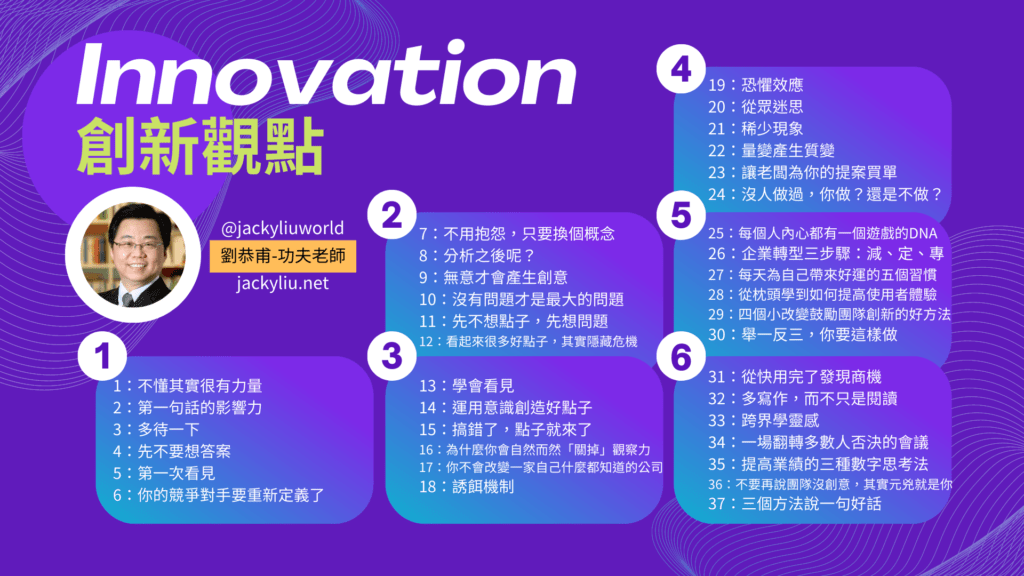為什麼我們常對許多現象視而不察
我們的認知總是習慣性的將看到的東西套在自己既有的想法上,因此我們常對許多現象視而不察。回想一下,什麼時候你會對周遭的事物感到特別好奇?
「第一次」出國旅行、「第一次」進入新環境、「第一天」到新公司上班、或是「第一次」看見特別的事物等等,此時你通常會仔細觀察周遭,讓自己融入新環境或了解新事物。
好點子的來源也是這樣,讓自己置身於新環境,仔細觀察周遭,就能發掘新點子。
刻意練習「第一次看見」
有一家公司的產品常常收到客戶抱怨不好操作,可是研發部門卻不以為然。為了一探究竟,公司決定派研發工程師前往顧客家中,觀察顧客如何「第一次」使用產品,並要求他們要留意意想不到的情形,只要「第一次」看到意想不到的情形,必須詢問顧客:「你為什麼這麼做?」結果研發工程師發現了許多「第一次」看起來沒道理也沒想到客戶會這樣使用的情形。公司根據這些情形將產品進行改進之後,不但客戶抱怨大幅降低,客戶滿意度也因此大大提高。
當你觀察客戶時,必須刻意尋找意想不到的情形,有什麼是你「第一次看見」?有什麼情形跟你的預期不一樣?你往往會因為理所當然的心態,習慣性的視而不見,而因此錯失了創新的機會。
今天,嘗試找一個平常不會去的新環境,仔細觀察周遭,刻意練習「第一次看見」吧!
〈功夫創新觀點〉05
<The first time I saw>
Our cognitive habitually will see things set in their existing ideas, so we often depends on many phenomena not observed. Recall that when things around you will feel particularly curious?
“First time” to travel abroad, “the first time” into a new environment, “the first day” to a new company to work, or “first” to see something special, and so on, then you would normally look closely around, let us into a new environment or learn new things.
Sources of good ideas, too, is to let us in the new environment, careful observation around, you can explore new ideas.
There is a company’s products often receive customer complaints difficult to operate, but R & D department does not agree. To find out, the company decided to send R & D engineers to customers’ homes to see how the customer “first” to use the product, and ask them to pay attention to unexpected situations, as long as the “first” to see the unexpected situation, we must ask Customer: “Why are you doing this?” The results of the R & D engineers found many “first” did not seem unreasonable to expect customers will use this situation. After the company under these circumstances improve the product, not only significantly reduce customer complaints, but also customer satisfaction thus greatly improved.
When you look at the customer, must be deliberately looking for an unexpected situation, what is your “first time I saw”? What is the situation with your expectations are not the same? You tend to take for granted because of the mentality, the habit of turning a blind eye, and thus missed the opportunity for innovation.
Today, try to find a new environment you will not go, careful observation around, deliberate practice “the first time I saw” it!
Good morning everybody!
<Kung Fu innovative ideas> 05

